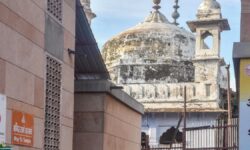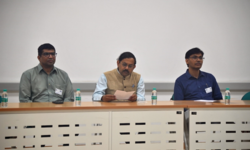JAIPUR:
Jaipur, the capital city of Rajasthan that turned pink in honour of Prince Albert and Queen Elizabeth II, boasts of gorgeous traditional textiles, majestic forts and palaces from medieval times. But there is also a modern edifice that unfailingly draws droves of tourists and patrons of art—Jawahar Kala Kendra (JKK), built by legendary architect Charles Correa.
As part of the ongoing India Heritage Walk Festival (IHWF), a guided architectural walk of this grand cultural centre will be conducted for visitors with special needs. Another walk from the event will take participants on a textile trail of the Pink City. Jaipur is among 20 cities hosting the month-long, multi-city IHWF 2018 organised jointly by Sahapedia (sahapedia.org), an online encyclopedia of Indian arts and culture, and Yes Culture, the cultural division of Yes Global Institute, a practising think tank of Yes Bank, to encourage citizens to explore the tangible and intangible heritage of their cities and towns.
Siddhant Shah, a national award-winning heritage architect and an access management consultant with UNESCO, National Museum and City Palace Museum, will conduct the first walk on February 13 to guide special needs visitors through the beautiful details of JKK. This specially curated walk at the cultural centre will allow visitors to understand why JKK is in true sense a metaphor of Jaipur, Jai Singh II and Jawaharlal Nehru.
The architectural walk will cover the 8-metre-high walled squares which houses the administrative block, exhibition galleries, open-air theatre, library, dormitories and coffee house. The building boasts of some brilliant paintings from the Hindu, Jain and Buddhist texts.
During the 90-minute walk aimed at fostering an inclusive experiential culture, visitors will explore elements of architecture and planning like shape, colour and iconography. For easier access, they will be provided ramps, wheelchairs, tactile maps and Braille books. The partner for this walk is Access for ALL, which aims at pushing the boundaries of physical, intellectual and social access through innovative, indigenous design and advocacy.
In the second walk, slated for Saturday, February 24, local residents will be taken on a textile trail in the city, where golden sands, indigo skies and crimson forts find an echo in its spectacular traditional fabrics and age-old Indigo, Bagru and Sanganeri block prints.
Sonal Chitranshi, an alumna of NIFT, Gandhinagar, and founder of Soul Roots that develops garments, soft home furnishings and textiles, will conduct this walk in association with Breakaway, which helps intrepid travellers explore India’s art and cultural heritage through off-the-map journeys.
This walk includes meeting a traditional block maker and printer who will provide participants a peek into his collection of exquisite brass blocks and hand blocks. They will also visit the home studio of a designer showcasing exquisite gota-patti and aari work (a form of hand embroidery and embellishment on decorative textiles and wedding clothes).
Another highlight of the walk is a meeting with a self-taught artist, whose journey began with the creation of a Srinath-ji on canvas, inspired by his visit to the famous Nathdwara temple in Udaipur. He will talk about his innovative approach which unites the texture of oil to embellishing each canvas with kasab, dabka, zardozi, upping it with semi-precious kundan jewellery, silver plates and real gold.
Details about the walks and other programmes of IHWF 2018, map routes and registration information are available on http://www.indiaheritagewalkfestival.com
Vaibhav Chauhan, Festival Director (IHWF) and Secretary, Sahapedia, says, ‘The India Heritage Walk Festival 2018 is a celebration of all that Sahapedia stands for. In an attempt to create authentic, credible, and exhaustive content on our rich heritage and culture, we are developing a network of cultural practitioners across the country. This festival is a part of this pan-India movement, making heritage spaces more popular, more accessible, and more experiential.’
Rana Kapoor, MD & CEO, Yes Bank and Chairman, Yes Global Institute, says, ‘India is blessed with a rich heritage and cultural history, which is abundantly manifested in monuments and architectural sites across our country. Civil society participation in our Nation’s heritage, aided by activities such as heritage walks, is integral to the preservation and conservation of these sites. Such heritage tourism initiatives, with the wholehearted participation and involvement of local communities and citizens, have the potential to instill immense national pride and further the agenda of heritage development.’
Preeti Sinha, Global Convenor, Yes Global Institute, says, ‘The understanding of heritage in 21st century India has expanded from the protection of historic buildings and monuments to focus on more general understanding of the wider context and preservation of tangible and intangible cultural forms. Through active engagement with built, natural and living heritage through the design of walks, talks, and digital media such as films and social forums, the festival is a touchstone for conscious thinking towards formulating historically-sensitive policy and decision making.’
IHWF 2018, covering 20 cities and towns around the country, features walks to historical monuments and shrines, well-known landscapes, places known for art and culture, cuisine and flourishing trade. There is also an online film festival of documentaries based on cultural themes and lecture series curated as Baithaks and Instameets as part of nearly 70 events scheduled throughout the month.




